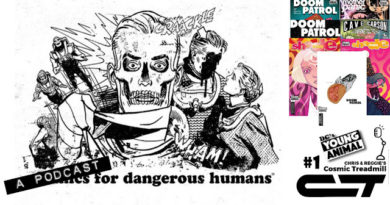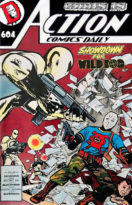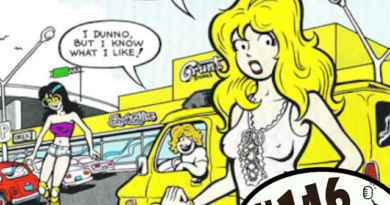Reggie and Me – Kefauver’s Senate Interim Report (1955)
Today’s piece will take a look at the Kefauver-penned Senate Interim Report from March, 1955… and will end with some wisdom that, time and again, Reggie would attempt to impart on me.
—
Senator Kefauver opened his Report with an introductory piece, in which he basically describes the scope and goal of what he is trying to do as it pertains to curbing crime/horror comics.
From here, he includes a brief history of early comics and comics publication:
- 1896 saw the first Yellow Kid strips by Richard Outcalt
- 1911 saw the first publication devoted to comics, when The Chicago American offered reprinted Mutt and Jeff strips in pamphlet form for clipping coupons
- 1935 was the first “present day” comic book, with New Fun Comics #1
- 1938 saw Superman debut in Action Comics #1
Then, some statistics regarding comics publication in the mid-1950’s:
- There were 112 different comics publishers (most based in New York City)
- Minimum comic print-runs were 300,000
- There were approximately 95,000-110,000 active newsstands nationwide
Then… he begins citing specifics regarding the nature of crime and horror comics. Here are a couple (though he does go on):
- “Bottoms Up” from Story Comics
- In which, an alcoholic husband steals money from his wife in order to buy hooch from some bootleggers. She finds out, and… kills him with an ax. She then returns the alcohol to the bootleggers… only, with her husband’s body parts stuffed into the bottles
- “Frisco Mary” from Ace Comics
- Mary runs a violent gang, and murders an already wounded Police Officer
Kefauver calls into question the methods used by comics in order to portray violence:
- Violence/Murder is premeditated, there is ample “lead-up”
- Use of supernatural phenomena in everyday life
- Portrayal of supernatural beings
- Language and verbiage used in narration and dialogue both stimulates the reader and reinforces their belief/acceptance of both the supernatural… and violence
Which finally brings him to the crux of his entire argument… are crime and horror comics a contributing factor in juvenile delinquency? Kefauver actually invokes Frederic Wertham’s name here by stating that well-adjusted children were the so-called “Innocents” being “Seduced”. Ol’ Estes is very careful with his phrasing here… as he doesn’t claim a direct causation, but speculates and attributes that many juvenile offenses were inspired by crime comics.
Not only does Wertham get a name-drop, but… one of his academic opponents does as well. Frederic (another Frederic) M. Thrasher wrote The Comics and Delinquency: Cause or Scapegoat, which appeared in The Journal of Educational Sociology (December, 1949). Rather than explore Thrasher’s article, which criticizes Wertham’s approach, sample-size, and overall data… Kefauver simply adds a footnote which states that Wertham’s findings are not empirical. You’d think this would be worthy of more than just a lousy footnote… but, shining a light on this might ruin the narrative.
Back to the kids… this time, the “bad” ones. What if you put a comic in the hands of a kid who’s already maladjusted/antisocial? And, that’s antisocial in the psychological way… not the “I don’t like talking to people” way… that’s being “unsocial” not antisocial. Kefauver states that crime comics give “support and sanction” to such adolescents… which sounds like a whole lot of nothing.
Crime comics are cited as providing “technique” for how to commit a crime, and ways of avoiding detection after committing it. Crime comics usually glamorize criminal careers (until the comeuppance, of course). Vigilantes are depicted as being above the law, which grants them the right to kill “in the name of justice”. Kefauver, at this point, compares excessive comics reading to alcoholism… which, at this point… I’m not sure what would be the more expensive habit/vice. He does hedge his bets here, however, stating that there will need to be more research conducted. Ya don’t say?
 Leaving actual story content behind for a bit, Kefauver turns his attention to the other parts of the “comics package” that might be questionable. Things like advertisements for weapons… guns, knives, bows and arrows. Also, he mentioned that the Food and Drug Administration has shown concerns regarding some of the pseudomedical nostrums advertised in comics: pimple creams, weight-loss pills (including Kelpidine chewing gum), and various muscle building methods.
Leaving actual story content behind for a bit, Kefauver turns his attention to the other parts of the “comics package” that might be questionable. Things like advertisements for weapons… guns, knives, bows and arrows. Also, he mentioned that the Food and Drug Administration has shown concerns regarding some of the pseudomedical nostrums advertised in comics: pimple creams, weight-loss pills (including Kelpidine chewing gum), and various muscle building methods.
Kefauver even left the entire “comics package” to discuss potential misuse of mailing lists by comic book companies… because, we’re sure the comics biz were the only companies exploiting their address books.
Kefauver feared ramifications of exportation of comics to other countries do to the depiction of some races/cultures in American comics. Well, what’s that we said about the stuck clock being right twice a day? He actually has a point here. He worried that comics could lead to an “international incident”, which… might just be overselling it a tad.
In a staggering bit of “what year is this?”, Kefauver worries that specific sociopolitical ideologies were being forced upon the uninformed readership. Well, same as it ever was, right? Only difference is today, the writers are far less subtle about it.
So… up to this point, we’ve really established nothing, right? We have just as many questions as we did before the three-day Senate Subcommittee Hearings. I suppose it’s time for Estes to ask the big question: Where does the responsibility for “policing” crime and horror comics rest?
First, he wants it made crystal clear that the Senate Subcommittee is not attempting at government censorship of comics materials… which feels a bit like he’s “protesting too much”. Doesn’t shy away from government intervention as it pertains to those slippery “tie-in sales”, however.
Are parents ultimately responsible for the material their children have access to? Heavens no. The report specifically states that“Attempts to shift all responsibility to parents is unjustified.” This report places much higher emphasis on “concerned” citizen brigades than the growed-people that children actually live with.
From here, Kefauver basically runs down the entire comics/distribution food chain attempting to look for answers. Worth noting, when he writes about the newsstands he plainly states that those vendors don’t have the time to appraise everything they receive in a shipment. Funny… when that was part of someone’s testimony… it was quickly dismissed by the Court. Oh well. I suppose if we’re looking to American politicians for “integrity”, we’ve already lost.
It’s ultimately concluded that the responsibility rests with the Publishers… and so, they’re going to be allowed to “Self-Regulate” (well, Self-Regulation in accordance with suggestions made by committee). A new association will be formed, and a new code will be adopted and adhered to.
- “The Subcommittee intends to watch with great interest the activities of this association and will report at a later date on this effort by the comic book industry to eliminate questionable comic books.”
This brings us right up to… the actual Comics Code, which we’ll talk more about tomorrow. This is the episode which covers everything I wrote about over the last three days:
—
This was an episode we were very proud of. Back before I started making podcasts, I was a pretty rabid listener of them. I mentioned that our coverage sort of “ruined” other shows for me… which, hey… it might be a hot-take, but it’s my hot-take. I’d never heard a show go into this much historical depth… and to see it come together was such a thrill. But then… something happened, which kind of put a crimp in my mood.
We shared this episode on social media… and, ya know… we were still very young in the game, and even at our “height” we never got all that much in the way of “word of mouth” (relatively speaking). So, we put it out there… and a few hours later, some knucklehead retweeted it to a podcast quite a bit higher up on the “totem pole” than Reggie and I would ever be. This knucklehead told this other, far more popular show, that they should do a show “just like this one”.
It was there that I my pride turned to protectiveness. I had this revelation that… with all of our hard work… all of the hours we’d spent absolutely buried in this Comics Code material… at the end of the day, all we really did was make it that much easier for a more popular show to just slide in, take what we did… and do it again themselves. Only difference between them and us is: they have an established audience and a “clique”.
I got pretty hot at this. I couldn’t understand why this knucklehead… who had, I would assume, already listened to our program… run to a bigger show and ask them to do the same thing we did. I saw this… and, got a hold of Reggie… and I think this was the first time he saw me as the sorta paranoid goofball that I was/am. I wanna say he got a bit of a kick out of it… as it showed him how much our project really meant to me.
Thing about Reggie… he was always so cool. This sort of thing didn’t bother him at all. He allowed himself to be proud. He knew what we put out there was quality… and for him, that was enough. I, on the other hand, was getting really bogged down in details… things like podcast-plagiarism, which isn’t really a “citable” thing when you’re as small as we were/are… things like being given credit… which, again if it’s a big podcast taking material from a small one… more often than not, that small one ain’t getting a nod.
I told him here, maybe for the first time, that I wished I could be more like him. To learn to “enjoy the ride”… to allow the “intrinsics” to feed my self-actualization. That, unfortunately, was a bit of wisdom that never made its way into my creatory-makeup… and it certainly wasn’t from a lack of trying on Reggie’s part. I still try and keep his advice in the back of my mind… but, I guess I’m just not as secure in my abilities as he was.
In the years that followed, there would be several occasions where our work would be “lifted” (always without credit)… sometimes verbatim. Now, I do believe in coincidences… but when someone delivers one of our lines with the exact verbiage and cadence that we did? That’s probably not a coincidence.
Time and again, I’d get hot. Reggie would always settle me down. That is one of those things I’m going to have to adjust to not having anymore. Reggie’s overall coolness and confidence was huge to me. It helped me to put things into perspective. His was an opinion I highly valued… and, basically… if he was happy with what we did, it told me that we were successful in whatever project we set our sights on. If not for his confidence and positive attitude, I doubt I would’ve been able to stick with this project/these projects for as long as I have.
We shared this episode on social media… and, ya know… we were still very young in the game, and even at our “height” we never got all that much in the way of “word of mouth” (relatively speaking). So, we put it out there… and a few hours later, some knucklehead retweeted it to a podcast quite a bit higher up on the “totem pole” than Reggie and I would ever be. This knucklehead told this other, far more popular show, that they should do a show “just like this one”.
It was there that I my pride turned to protectiveness. I had this revelation that… with all of our hard work… all of the hours we’d spent absolutely buried in this Comics Code material… at the end of the day, all we really did was make it that much easier for a more popular show to just slide in, take what we did… and do it again themselves. Only difference between them and us is: they have an established audience and a “clique”.
I got pretty hot at this. I couldn’t understand why this knucklehead… who had, I would assume, already listened to our program… run to a bigger show and ask them to do the same thing we did. I saw this… and, got a hold of Reggie… and I think this was the first time he saw me as the sorta paranoid goofball that I was/am. I wanna say he got a bit of a kick out of it… as it showed him how much our project really meant to me.
Thing about Reggie… he was always so cool. This sort of thing didn’t bother him at all. He allowed himself to be proud. He knew what we put out there was quality… and for him, that was enough. I, on the other hand, was getting really bogged down in details… things like podcast-plagiarism, which isn’t really a “citable” thing when you’re as small as we were/are… things like being given credit… which, again if it’s a big podcast taking material from a small one… more often than not, that small one ain’t getting a nod.
I told him here, maybe for the first time, that I wished I could be more like him. To learn to “enjoy the ride”… to allow the “intrinsics” to feed my self-actualization. That, unfortunately, was a bit of wisdom that never made its way into my creatory-makeup… and it certainly wasn’t from a lack of trying on Reggie’s part. I still try and keep his advice in the back of my mind… but, I guess I’m just not as secure in my abilities as he was.
In the years that followed, there would be several occasions where our work would be “lifted” (always without credit)… sometimes verbatim. Now, I do believe in coincidences… but when someone delivers one of our lines with the exact verbiage and cadence that we did? That’s probably not a coincidence.
Time and again, I’d get hot. Reggie would always settle me down. That is one of those things I’m going to have to adjust to not having anymore. Reggie’s overall coolness and confidence was huge to me. It helped me to put things into perspective. His was an opinion I highly valued… and, basically… if he was happy with what we did, it told me that we were successful in whatever project we set our sights on. If not for his confidence and positive attitude, I doubt I would’ve been able to stick with this project/these projects for as long as I have.





Sounds like Reggie knew what he was talking about. Do quality work that you are proud of and no one can take that away from you.
He was most definitely right… that's one of those lessons I wish I was able to better receive and accept. Even to this day, rather than feeling "proud" when I finish a project, I become instantly "protective" of it.
I worry that someone higher on the food chain (which is a very long list of folks) might stumble upon the year's worth of Action Comics Weekly I put together… lazily summarize it, and release it on their own without giving credit. Same with my deep-dives on things like Vartox and the DC Insert Prevues. Sort of thing has happened several times… and it's never pleasant.
Reggie was very cool about stuff like that… just another way I wish I were more like him!